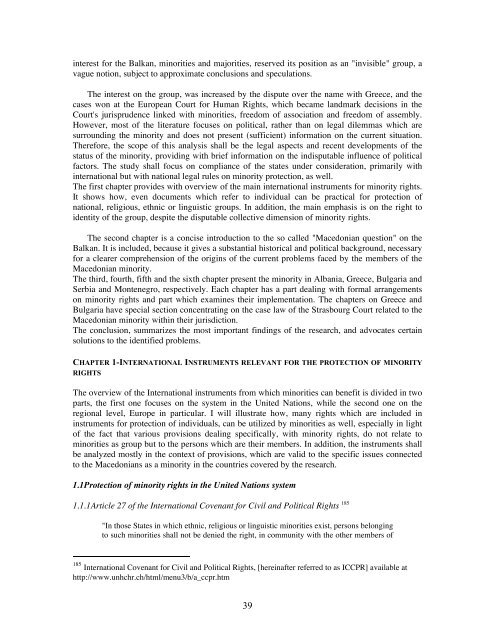Volume IV, Issue II (April 2006) - Columbus School of Law
Volume IV, Issue II (April 2006) - Columbus School of Law
Volume IV, Issue II (April 2006) - Columbus School of Law
You also want an ePaper? Increase the reach of your titles
YUMPU automatically turns print PDFs into web optimized ePapers that Google loves.
interest for the Balkan, minorities and majorities, reserved its position as an "invisible" group, avague notion, subject to approximate conclusions and speculations.The interest on the group, was increased by the dispute over the name with Greece, and thecases won at the European Court for Human Rights, which became landmark decisions in theCourt's jurisprudence linked with minorities, freedom <strong>of</strong> association and freedom <strong>of</strong> assembly.However, most <strong>of</strong> the literature focuses on political, rather than on legal dilemmas which aresurrounding the minority and does not present (sufficient) information on the current situation.Therefore, the scope <strong>of</strong> this analysis shall be the legal aspects and recent developments <strong>of</strong> thestatus <strong>of</strong> the minority, providing with brief information on the indisputable influence <strong>of</strong> politicalfactors. The study shall focus on compliance <strong>of</strong> the states under consideration, primarily withinternational but with national legal rules on minority protection, as well.The first chapter provides with overview <strong>of</strong> the main international instruments for minority rights.It shows how, even documents which refer to individual can be practical for protection <strong>of</strong>national, religious, ethnic or linguistic groups. In addition, the main emphasis is on the right toidentity <strong>of</strong> the group, despite the disputable collective dimension <strong>of</strong> minority rights.The second chapter is a concise introduction to the so called "Macedonian question" on theBalkan. It is included, because it gives a substantial historical and political background, necessaryfor a clearer comprehension <strong>of</strong> the origins <strong>of</strong> the current problems faced by the members <strong>of</strong> theMacedonian minority.The third, fourth, fifth and the sixth chapter present the minority in Albania, Greece, Bulgaria andSerbia and Montenegro, respectively. Each chapter has a part dealing with formal arrangementson minority rights and part which examines their implementation. The chapters on Greece andBulgaria have special section concentrating on the case law <strong>of</strong> the Strasbourg Court related to theMacedonian minority within their jurisdiction.The conclusion, summarizes the most important findings <strong>of</strong> the research, and advocates certainsolutions to the identified problems.CHAPTER 1-INTERNATIONAL INSTRUMENTS RELEVANT FOR THE PROTECTION OF MINORITYRIGHTSThe overview <strong>of</strong> the International instruments from which minorities can benefit is divided in twoparts, the first one focuses on the system in the United Nations, while the second one on theregional level, Europe in particular. I will illustrate how, many rights which are included ininstruments for protection <strong>of</strong> individuals, can be utilized by minorities as well, especially in light<strong>of</strong> the fact that various provisions dealing specifically, with minority rights, do not relate tominorities as group but to the persons which are their members. In addition, the instruments shallbe analyzed mostly in the context <strong>of</strong> provisions, which are valid to the specific issues connectedto the Macedonians as a minority in the countries covered by the research.1.1Protection <strong>of</strong> minority rights in the United Nations system1.1.1Article 27 <strong>of</strong> the International Covenant for Civil and Political Rights 185"In those States in which ethnic, religious or linguistic minorities exist, persons belongingto such minorities shall not be denied the right, in community with the other members <strong>of</strong>185 International Covenant for Civil and Political Rights, [hereinafter referred to as ICCPR] available athttp://www.unhchr.ch/html/menu3/b/a_ccpr.htm39
















